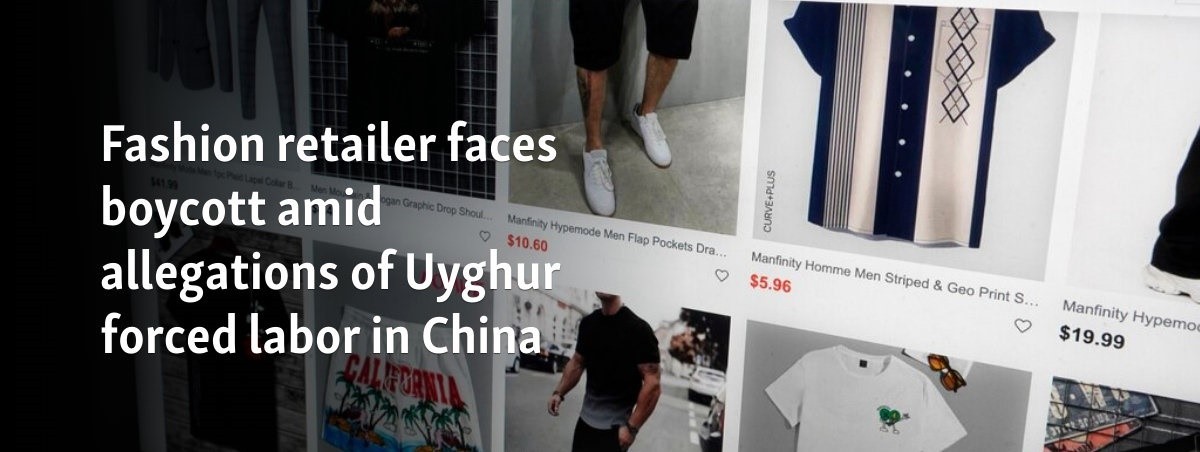Forced labour still haunts Xinjiang: Chinese fashion retailer faces boycott amid allegations of exploiting Uyghurs
The Save Uyghur Organization, which is powered by Chicago-based human rights organisation ‘Justice for All’, has started a boycott campaign against Chinese online fast-fashion retail Shein alleging it is involved in the forced labour of Uyghur Muslims in China.
‘Justice for All’, advocates for stopping “China’s genocide of the Uyghurs and other Turkic people of East Turkistan.”
Head of the Save Uyghur campaign, Arslan Hidayat, says Shein’s alleged use of forced labour exacerbates oppression of the Uyghur people.
“It is crucial for Muslims to use their consumer power to protest against the use of forced labor and to demonstrate solidarity with the Uyghur community,” Arslan Hidayat was quoted as saying by VOA.
“It is incumbent upon us to prioritize ethical consumption practices and advocate for justice for the Uyghur people,” Hidayat added.
China, as usual, denies any existence of forced labour in Xinjiang.
However, studies and reports over the years are claiming something different.
According to a new research previewed exclusively by POLITICO, the Chinese region of Xinjiang continues to subject members of the Uyghur ethnic group to forced labour two years after a damning report of the United Nations detailed the abusive practice.
The findings of the research is likely to pressure Western lawmakers to further restrict imports of products from Xinjiang.
The research, which focuses on 2023 and early 2024, added to a growing body of evidence that China is using forced labour and mass internment camps to control the Uyghurs, which ramps up pressure on the European Union (EU) to finalize plans for a bloc-wide ban on imports of products made with forced labour.
The Uyghur region in China’s northwest is autonomous in name only as the Chinese Communist Party (CCP) has consistently appointed Han Chinese to the post of party secretary, the top political position.
Uyghurs officially make up about 45 percent of Xinjiang’s population, with Han Chinese at about 42 percent.
Xinjiang Production and Construction Corps, a paramilitary unit that oversees economic output as well as law and order, has set the region apart from other provinces.
Researchers have referred to the entity as a colonial agency, and both the United States and European Union have sanctioned senior XPCC officials.
In the last few years, reports of forced sterilization and involuntary ethnic integration have emerged, while up to 1.5 million Uyghurs are believed to have been sent to internment camps, calling into question the West’s increasing reliance on Xinjiang as a source for their global supply chains.
Director of China Studies at the Washington-based Victims of Communism Memorial Foundation, Adrian Zenz, argues that the regional Xinjiang government has conducted mass re-education internment campaigns and other policies aimed at assimilating the Muslim group under the principle of “high-quality development.”
According to the report, “The labour transfer scheme is the only forced labour policy that has been directly linked to the production of cotton, tomatoes and tomato products, peppers and seasonal agricultural products, seafood products, polysilicon production for solar panels, lithium for electric vehicle batteries, and aluminium for batteries, vehicle bodies, and wheels.”
Zenz, who was previously accused of spreading disinformation by Beijing, described the country’s industrial parks as “premier destinations for the most coercive forms of labour transfers and the forced work placements of re-education detainees.”
The US Department of State, in its report titled 2019 Report on International Religious Freedom: China, stated that it was estimated that 100,000 Uyghurs and other ethnic minority ex-detainees in China may be working in conditions of forced labour following detention in re-education camps.
As per Australian Strategic Policy Institute’s 2020 report titled Uyghurs for Sale and Adrian Zenz’s study, Beyond the Camps: Beijing’s Long-Term Scheme of Coercive Labor, Poverty Alleviation and Social Control in Xinjiang, China has been included on the List of Goods Produced by Child Labour of Forced Labour (TVPRA List) since 2009.
In 2020, the Bureau of International Labor Affairs (ILAB) added five goods produced by forced labour by Muslim minorities in China to the 2020 edition of the TVPRA List. These goods include gloves, hair products, textiles, thread/yarn, and tomato products.
Later in 2021, ILAB added an additional good, Polysilicon, produced by forced labour by Muslim minorities in China.
However, after facing huge backlash over the alleged Uyghur forced labour, a spokesperson of Shein, which is known for its affordable clothing globally, said the retailer has a zero-tolerance policy for forced labour.
“We take visibility across our entire supply chain seriously, and we are committed to respecting human rights. To comply with US law, we require our contract manufacturers to only source cotton from approved regions,” Shein spokesperson was quoted as saying by VOA.
Meanwhile, concerns surrounding the brand’s sourcing practices extend to its use of Xinjiang cotton.
A laboratory test conducted by Bloomberg in November 2022 revealed that the Chinese fast-fashion retailer’s clothing contains fibers sourced from Xinjiang cotton, which is prohibited in the United States under the Uyghur Forced Labour Prevention Act.
The act, enacted in June 2022, prohibits imports from Xinjiang and goods manufactured by Uyghurs allegedly coerced into working for minimal wages, unless companies can demonstrate the absence of forced labour.
Despite US restriction on Xinjiang imports, Shein’s shipments often evade scrutiny through the de minimis rule, which exempts packages under $800 from customs inspections, enabling them to enter the US without thorough examination, according to reports.
Shein, which has been promoting its products through social media influencers, including Muslims, was established in 2012 and backed by California-based Sequoia Capital and China-based IDG Capital.
It has evolved into a fast-fashion giant targeting Generation Z consumers outside China.
In 2019, Shein moved its headquarters from mainland China to Singapore and operates in more than 150 countries and regions.
According to a report by the Financial Times, Shein’s total sales reached $45 billion in 2023, and its last year’s profit nearly tripled from 2022 to more than $2 billion.
ENDS













